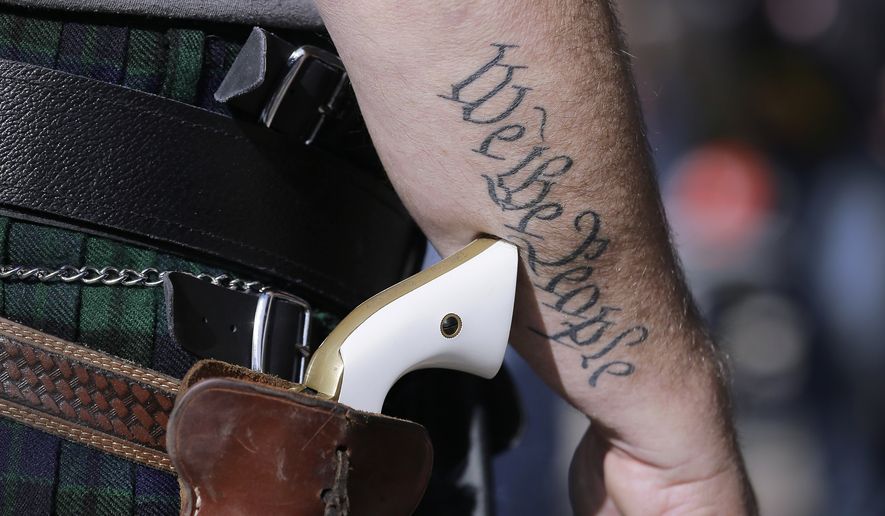A federal judge in Florida has deemed it unconstitutional to bar a truck driver from carrying a handgun in a post office. The ruling cites the Supreme Court’s recent guidance on historical policies on firearms, but legal experts say it doesn’t square with the high court’s decisions on weapons.
U.S. District Judge Kathryn Kimball Mizelle ruled in early January that federal prosecutors failed to show any historical regulations against carrying firearms at ordinary post offices in their case against truck driver Emmanuel Ayala.
Mr. Ayala, who hauled packages for the U.S. Postal Service, carried his Smith & Wesson 9 mm in a fanny pack. He entered a federal postal facility in Tampa with his firearm in September 2022 and was subsequently charged with violating federal law and resisting arrest.
He challenged the applicability of 18 U.S. Code § 930(a), which makes it a felony to possess a firearm or dangerous weapon in federal facilities.
Judge Mizelle, a Trump appointee, ruled in his favor. She warned about the dangers of government encroachment and how a ban on firearms at government buildings could nullify the Second Amendment in large areas.
“Post offices have existed since the founding, as have threats to the safety of postal workers and the public entering those locations. Yet the historical record yields no ‘distinctly similar historical regulation addressing’ those safety problems by regulating firearms in post offices,” Judge Mizelle wrote.
“Whatever the historical record permits with respect to firearms regulation on government property, that legal principle cannot be used to abridge the right to bear arms by regulating it into practical non-existence,” she wrote.
“At some point, when twenty-eight percent of land in the United States is owned by the federal government and many ordinary activities require frequenting a ‘Federal facility,’ the government’s theory would amount to a nullification of the Second Amendment right altogether.”
Mr. Ayala’s attorneys did not immediately respond to a request for comment on the judge’s order.
A spokesperson for the Justice Department did not immediately respond on whether it will appeal.
Judge Mizelle’s decision dismissed Mr. Ayala’s first charge, reasoning that the ban on firearms on federal property is unconstitutional in light of the Supreme Court’s 2022 ruling in New York State Rifle & Pistol Association Inc. v. Bruen.
The high court ruled 6-3 in that dispute that any gun control law must be consistent with the nation’s founding dating back to the ratification of the Second Amendment.
Judge Mizelle said the government provided no historical analog to support its prohibition of Mr. Ayala from carrying his weapon.
Jacob D. Charles, a professor at Pepperdine Caruso School of Law, said the judge rejected the Supreme Court’s 2008 precedent permitting guns in schools and government buildings. That case, District of Columbia v. Heller, examined restrictions on firearms kept in the home.
“The court’s open rejection of Heller’s statement that bans on guns in government buildings are permissible seems hard to square with Bruen’s embrace of Heller rather than its rejection of that decision’s conclusions,” Mr. Charles said.
Andrew Willinger, a Duke University School of Law professor, said the judge differentiated a regular post office from other government buildings where voting or judicial deliberations occur. He suggested that the decision doesn’t apply beyond Mr. Ayala’s case.
He said any challenge to a federal facility’s ban on firearms would likely require a Bruen analysis on a case-by-case basis.
“It kind of highlights the tension between some of the things the Supreme Court has said in its earlier Second Amendment decisions … and its Bruen test,” Mr. Willinger said. “The question then is how much, if at all, should those statements still apply when laws are now challenged under the text, history and tradition test.”
Judge Mizelle considered the Heller ruling in her decision and said its description of prohibiting guns at schools or government buildings was simply an opinion and was not the focus of the Heller case. She suggested that the high court didn’t consent to banning firearms in federal spaces.
“Nothing in Supreme Court dicta establishes that the United States may ban firearms in all government buildings,” she wrote. “The sensitive-places exception cannot sweep so broadly.”
Before the Bruen decision, federal courts ruled that guns could not be carried even in the parking lot of a post office because it was part of the federal facility.
Carl Bogus, a law professor at Roger Williams University, said lower courts issued conflicting rulings as a result of the Bruen ruling.
He said the justices must clear up confusion in the latest gun case pending before them: United States v. Rahimi.
That dispute involves a man under a domestic violence protective order challenging a federal law banning him from handling a gun. His case argues that the ban conflicts with the nation’s history and tradition dating back to its founding.
Mr. Bogus said Judge Mizelle’s ruling is unlikely to have widespread effect or influence.
“The case is a one-off because Rahimi is out there and also because what one federal district judge decides is not that significant,” he said.
A ruling in Rahimi is expected by the end of June.
• Alex Swoyer can be reached at aswoyer@washingtontimes.com.




Please read our comment policy before commenting.